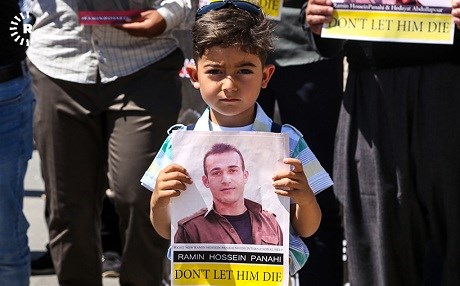ERBIL, Kurdistan Region – Iran is under fire for three death penalty cases drawing international attention.
“The Iranian authorities have a deplorable track record when it comes to the use of the death penalty. This execution is a travesty of justice that is abhorrent and unconscionable. It flies in the face of the huge public outcry in the country and is vengeance, not justice,” said Amnesty International in a statement on Monday.
The rights monitor was reacting to news that Mohamed Salas, 51, had been executed at dawn.
Salas was sentenced to death for the murder of three police officers during a protest by the Gonabadi Dervish religious minority, a Sufi sect of which he is a member.
The protests in February turned violent when security forces tried to disperse the crowd using tear gas and live ammunition. The three police officers were run over by a bus.
Salas retracted his confession during his trial, saying he had given it after being severely beaten.
Amnesty said Salas’ trial was unfair and his confession was extracted under torture. Video of his confession, made from a hospital bed, was broadcast on state TV weeks before his trial.
His body was buried without examination by a coroner, under armed guard without his family present, and hundreds of kilometres from where his family lives.
Iranian leader consider the beliefs of the Gonabadi Dervishes to be false, and members of the sect face discrimination, arrest, and attacks on their religious sites.
A Kurdish political prisoner is facing imminent execution.
Ramin Hossein Panahi was reportedly scheduled to be executed at the end of Ramadan. A fight broke out at the prison where he is being held on Friday when his fellow prisoners tried to prevent guards from taking Panahi out of his cell.
Prosecutors allege Panahi, who is a member of the armed Kurdish opposition group Komal, was carrying several weapons at the time of his arrest – a charge he denies.
UN human rights experts have again appealed for authorities to halt his execution.
“…we regret that Iran seems intent on execution Mr. Panahi, disregarding previous calls to annul the death sentence, and ensure he is given a fair trial,” Agnes Callamard, UN special rapporteur on extrajudicial, summary or arbitrary executions, said in a statement on Monday issued jointly with UN rapporteurs for health and torture.
Callamard and Renate Winter, chairperson for the Committee on the Rights of the Child, issued another appeal for Iran to halt the execution of a minor.
Mohammad Kalhori was sentenced to death at the age of 15 for killing his teacher. He is also expected to be executed any day.
“Iran has committed itself to prohibiting the use of the death penalty for all those under 18 by its ratification of both the International Covenant on Civil and Political Rights and the Convention on the Rights of the Child. As such, this execution is unlawful and arbitrary,” the two stated on Tuesday.
Iran has one of the highest rates of use of the death penalty worldwide, executing at least 507 people in 2017, though its use fell by 11 percent in 2017, according to Amnesty.

